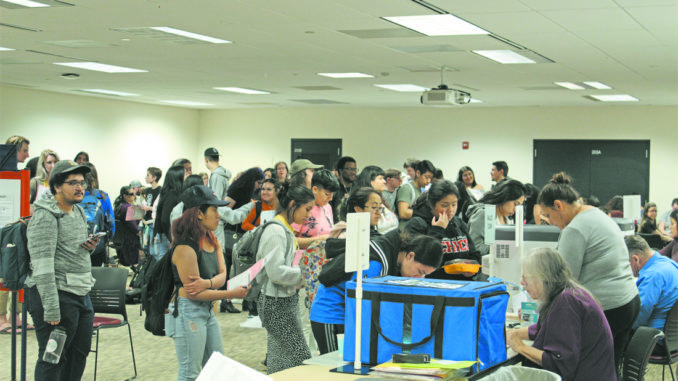
At this time of year in a typical campaign season, Ann Schwab would be organizing events and gearing up to meet with Chicoans face-to-face. Instead, Chico’s mayor has had to adapt to the times, throwing out those plans and keeping the threat of COVID-19 at bay by using phones and computers to connect with voters.
“I know a lot of people are still very concerned with adhering to all the basics—social distancing, wearing masks, not being in large events,” said Schwab, who is seeking re-election to the City Council in November. “We have been reopening and seeing the number of cases rise. … I want to be mindful of all those safety protocols, of making sure people feel safe to attend such events.”
Due to both the pandemic and significant changes to the ballot in Chico, this election cycle is a complex one to navigate—and that goes for candidates, election officials, voters and voter education advocates alike. Challenges abound, not the least of which is making certain the problems experienced during the March primary—including long lines at crowded vote centers—aren’t repeated in this time when social distancing is so paramount.
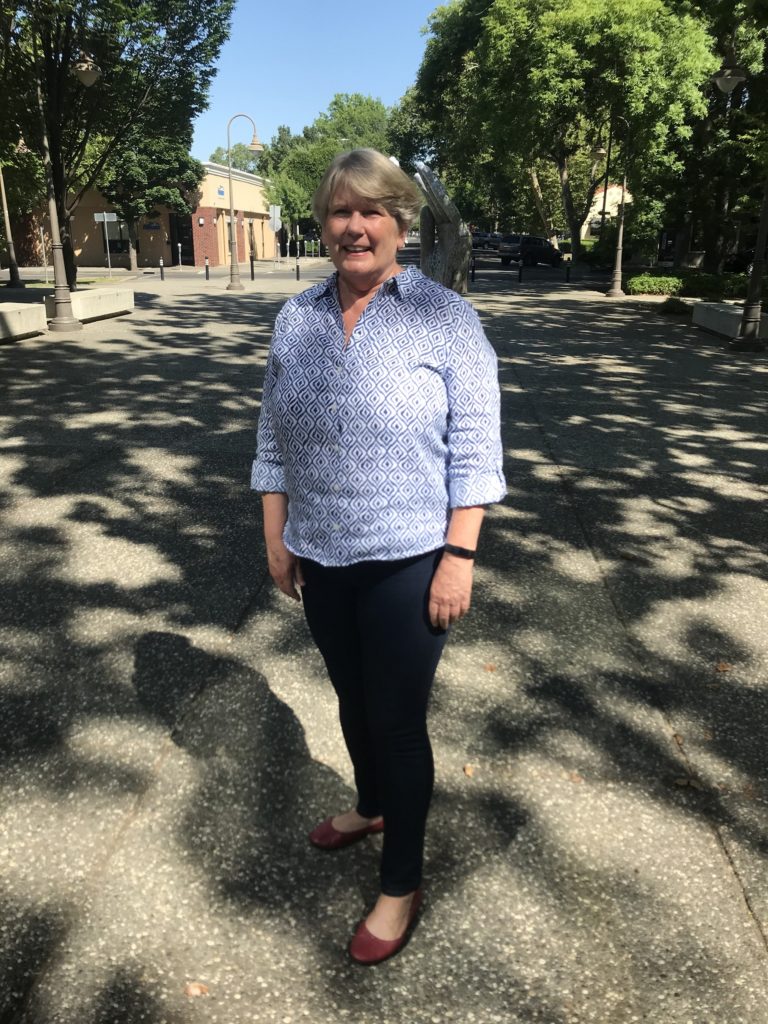
Ann Schwab is opting for virtual ways to campaign. (Photo by Jason Cassidy)
Planning ahead
Butte County Clerk/Recorder Candace Grubbs says the county’s new mail-in balloting system is essential to public health amid the pandemic and that her office is better prepared for November than it was this past winter.
The switch to an all-mail election was prompted by the displacement of thousands of voters after the Camp Fire, but the implementation did not go as smoothly as hoped during the primary. Long lines formed at several designated vote centers—locations set up to assist the electorate—with voters spending hours awaiting help in crowded rooms.
For November, Grubbs is securing larger facilities that will allow for social distancing. In addition, ballot drop-off boxes will be placed outside of every vote center, so that people won’t have to stand in line, she said.
The county plans to hire more people to work at the facilities, Grubbs said. An informational campaign is also in the works.
Grubbs cautioned that people should not wait until the last minute to register or to vote. Ballots should arrive the week of Oct. 5.
“What we’re doing is emphasizing, ‘Vote the ballot that is sent to you, and if you don’t have it, let us know early enough so we can get you that ballot,’” she said.
The League of Women Voters of Butte County also is grappling with concerns about keeping the public safe. Each election year, the organization hosts forums to educate voters on ballot initiatives and candidates.
Carol Burr, who spoke with the CN&R at the tail-end of her term as first vice president of the league, said the pandemic won’t prevent the organization from performing its vital work. Forums afford citizens an opportunity to really get to know the candidates—who they are and what kind of leaders they would make, she said.
“I don’t think there’s any substitute for that kind of direct access,” she said. “We are trying to take [advantage of] the technology, because it doesn’t seem clear when large groups of people are going to be able to safely meet in a space.”
What’s new for Chico?
Several big changes lie ahead for the city of Chico in the general election.
Nov. 3 marks the first time City Council seats are determined by districts and the first time residents of the newly annexed Chapman neighborhood get to vote in municipal elections.
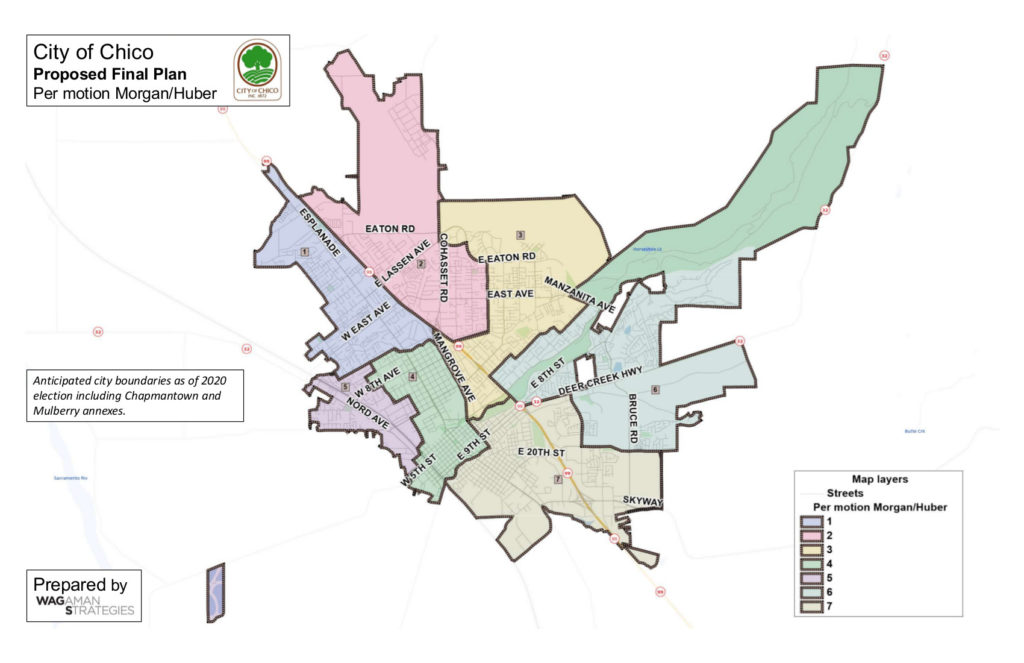
The switch to district elections was prompted by the threat of expensive lawsuits alleging the city had violated the California Voting Rights Act by holding at-large elections that created racially polarized voting and diluted minority votes.
Under the new system, voters will be asked to choose one candidate who best represents their district. Chico now has seven districts of roughly equal population. Representatives for four of them will be chosen this year; the remaining three districts will be up for grabs in 2022. The city is working on a webpage that outlines the map and other voter info.
Despite the controversy and subsequent publicity surrounding the switch, Grubbs anticipates receiving hundreds of calls from confused voters. By way of example, she noted that each election cycle results in voter queries related to the county’s district-based Board of Supervisors.
In terms of proposed ballot initiatives in Chico, the most notable was a long-planned 1-percent general sales tax increase. A survey ahead of the pandemic indicated voters would pass it, but the current economic outlook has largely diminished support. Neither that proposal nor any of the alternative tax measures floated at the June 23 council meeting received the five votes needed to place such a measure on the ballot.
In the coming weeks, however, the council is expected to consider putting a charter amendment on the ballot. It would ask voters whether to allow anyone at least 18 years old to run for a seat starting in 2022 (the current age requirement is 21).
In the running
It has been a quiet election season in some ways, Schwab told the CN&R. She’s seeking her fifth term on the City Council and is surprised more candidates haven’t announced campaigns for the four districts on the updoming ballot (the filing deadline is Aug. 7). She lives in District 3.
Only a handful of candidates are actively campaigning. This includes Councilman Randall Stone (District 5), and Planning Commissioner Rich Ober (District 7), who ran for a seat in 2018—with no competition as of yet in their respective districts. Chicoan Curtis Pahlka has filed paperwork for District 1, which comprises a portion of northwest Chico. However, two-term Councilman Sean Morgan resides there and has signaled that he may throw his hat in the ring.
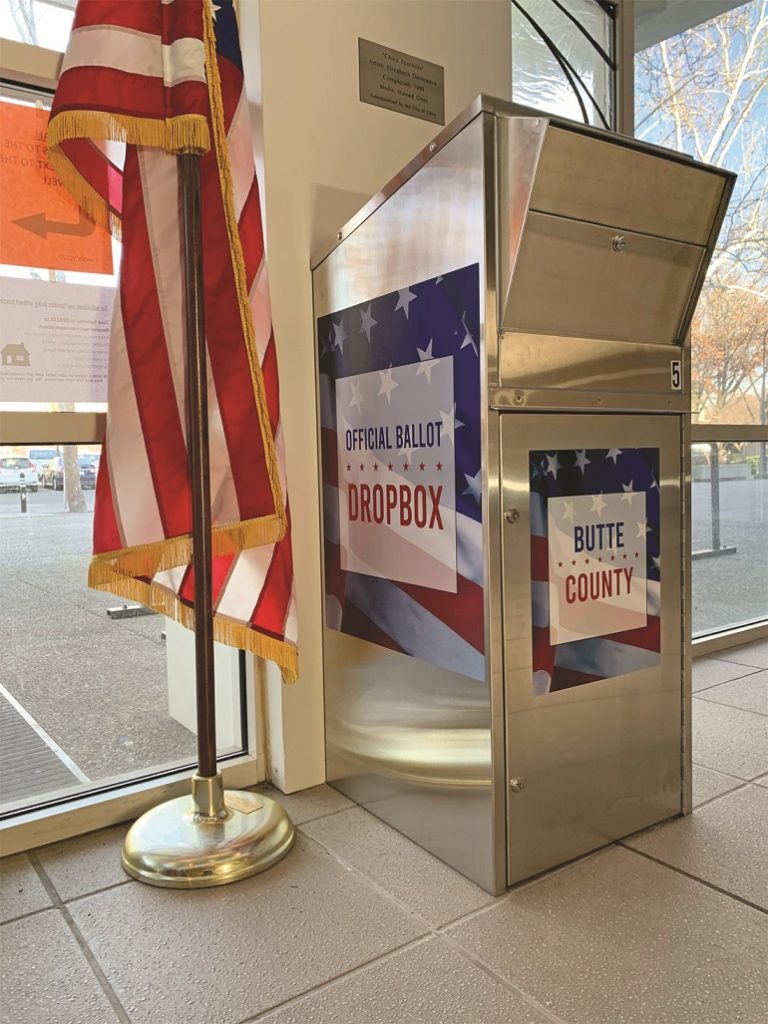
Schwab recently participated in a virtual event hosted by the Butte County Democrats, chatting with viewers during candidate spots. In the months to come, she envisions phone calls and virtual get-togethers through platforms like Zoom, rather than in-person visits.
On a practical level, both the pandemic and the switch to districts have made it challenging to meet fundraising goals, Schwab said. But it’s the personal side of campaigning she laments losing the most.
“Missing the connection will be the hardest part—the real, face-to-face connection,” she said.
Other incumbents are considering how to approach this election season as well. Morgan was not planning on running for re-election, he told the CN&R, but this year has changed his perspective.
“I had decided not to run but given the financial situation the city is about to find itself in (this time, through no fault of its own), I worry about our financial sustainability and our ability to adequately provide for public safety, roads, and our parks,” he wrote via email.
Stone also is focused on economics. In fact, it’s at the forefront of his mind these days, he told the CN&R. He’s especially concerned about how the looming recession on top of current events will effect the electorate.
Voter engagement, he said, is “hindered by the amount of trauma that is going on locally and nationwide and worldwide.
“I think that problem is only going to get worse as the economy doesn’t respond and we continue into a recession,” Stone continued. “When [people] don’t have any money and they’re trying to put food on the table, the ballot is going to be something that is less of a concern for them.”
Register to vote: It’s never too early. Go to registertovote.ca.gov

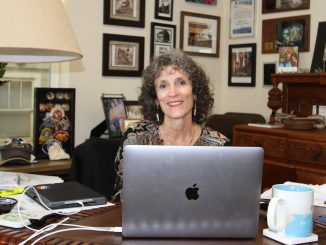
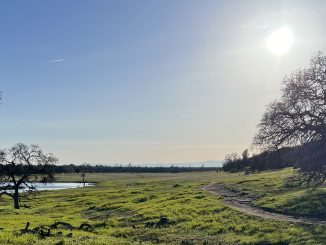
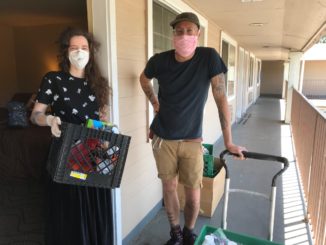
Be the first to comment